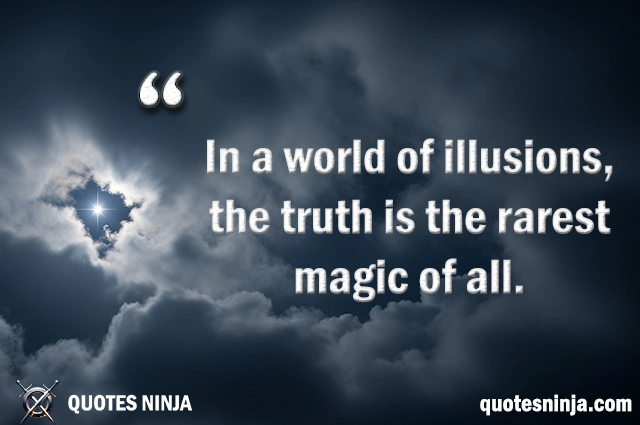
Deeper Meaning of Truth Quote:
Truth Quote: “In a world of illusions, the truth is the rarest magic of all.”
This quote, conveys a powerful idea about how uncommon and valuable truth is in a reality often clouded by deception, misinformation, or superficial appearances.
Here’s a breakdown of its meaning:
🔮 “In a world of illusions…”
- This part sets the stage: it’s describing a world where appearances are deceptive, people wear masks (figuratively), and reality is often distorted.
- “Illusions” can refer to lies, societal expectations, media spin, self-deception, or any false representation of what is.
✨ “…the truth is the rarest magic of all.”
- “The truth” is framed as something pure, powerful, and transformative—like magic.
- By calling it the rarest magic, the quote emphasizes how hard it is to find genuine truth amidst the falsehoods.
- It’s also suggesting that truth, when discovered, has a special, almost mystical power to cut through illusions and reveal what’s real—something that can change lives or shatter long-held beliefs.
💡 In essence:
The quote reflects on how rare honesty, authenticity, and clarity are in a world filled with deception. And when truth does appear, it’s not just valuable—it’s almost miraculous.
Here’s a story inspired by Truth Quote “In a world of illusions, the truth is the rarest magic of all.”
Truth Story: “The Final Revelation“
Vienna, 1905.
The velvet curtain of the Volkstheater shuddered before lifting slowly. A hush fell over the audience. Children sat forward. Women gripped their gloves. Men raised monocles to their eyes. At the center of the stage, standing as still as stone, was Eisenheim the Illusionist—a man who, though once hunted by the empire, had returned not in exile, but in legend.
No one knew how he’d come back. Rumors whispered he had died in Prague, or escaped to Cairo, or vanished into thin air—perhaps literally. Yet tonight, the illusionist stood before them again, his eyes dark with secrets and shadows.
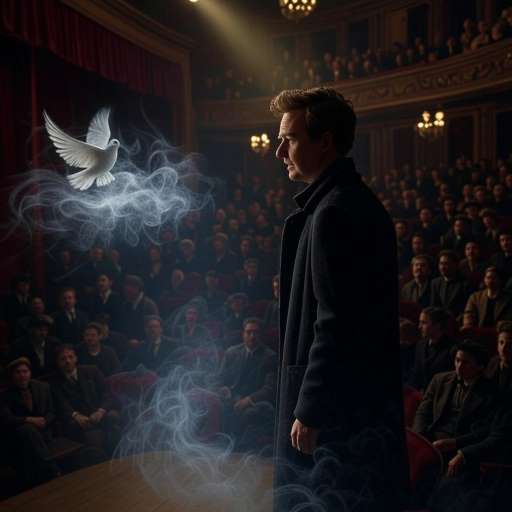
The Return of Eisenheim:
As he raised his hands, a soft golden light enveloped the stage. From the air, a white dove formed from mist, fluttering its wings as if alive. The crowd gasped—not because the trick was new, but because even now, Eisenheim’s illusions felt impossibly real.
But beneath the awe, something else lingered. A tension. A silence that settled too deep. Inspector Uhl, now retired and grayer than before, sat in the last row, arms folded. He hadn’t come for entertainment.
He had come for answers.
Fifteen years earlier, Eisenheim had faked his death to protect the woman he loved, Duchess Sophie von Teschen. Together, they’d escaped the iron grip of Crown Prince Leopold and dismantled the illusion of power that held Vienna captive. Uhl had let them go—out of conscience, or perhaps because he, too, believed in something more.
Now, Eisenheim was back, and Sophie was missing.
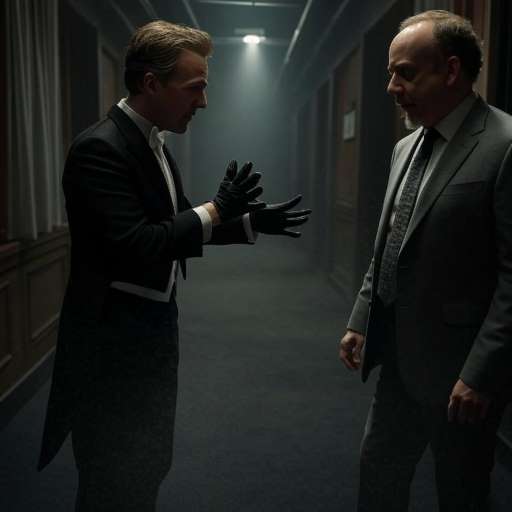
The Backstage Confrontation:
After the show, Uhl pushed through the dispersing crowd and found Eisenheim alone in the backstage hallway, removing his gloves. The magician didn’t flinch when he saw the inspector—only smiled faintly.
“You never liked the theater,” Eisenheim said, not as a question.
“I liked your theater even less,” Uhl replied, stepping closer. “You came back quietly. Why?”
“I never left,” Eisenheim replied. “Not truly.”
Uhl’s eyes narrowed. “And Sophie?”
Eisenheim paused. “She’s still hidden. But not from me.”
The next evening, a second performance was announced—“The Final Revelation.” Crowds poured in, curious, breathless. Whispers grew: Was this his farewell? A confession? Or something else entirely?
Onstage, Eisenheim stood once again under golden light. But this time, the stage was bare. No birds. No mirrors. Just him.
“Tonight,” he began, “I will show you a magic that has no sleight of hand. No smoke. No mirrors. Only truth.”
The audience murmured. Some leaned forward. Others frowned.
“In this city, truth has always been the rarest magic. Too dangerous to speak. Too costly to seek.”
He stepped forward, his voice sharper.
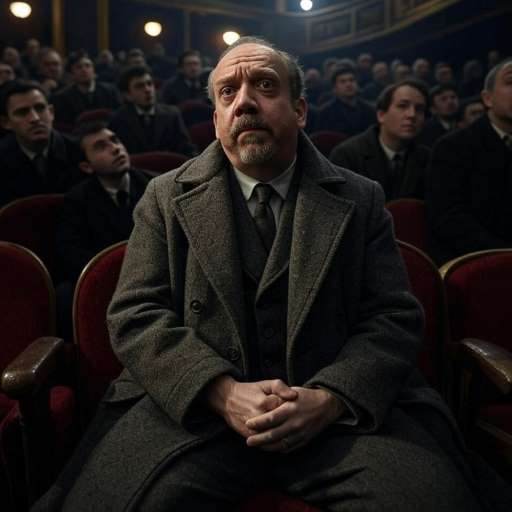
Inspector Uhl in the Crowd:
“You’ve come to see illusions. But I came to destroy one.”
And then, without warning, the screen behind him lit up. Projected was the image of Crown Prince Leopold, not as a ruler—but as a murderer. A hidden recording from long ago, capturing the prince’s threats to Sophie, his drunken violence, and his final, fatal mistake.
The crowd gasped. Some stood in disbelief. Uhl, seated again in the back, gripped the armrest.
The evidence had never surfaced. Until now.
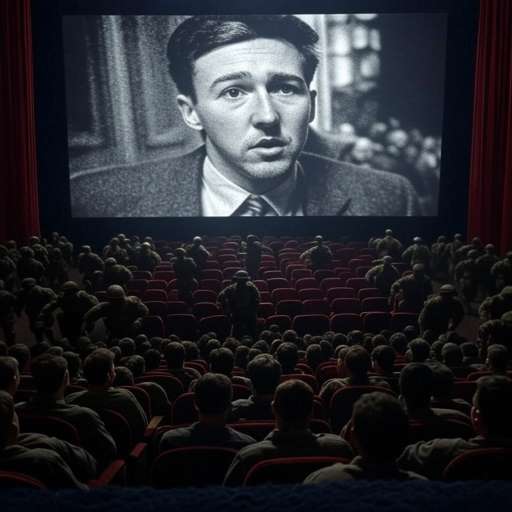
After The Final Revelation:
Suddenly, soldiers stormed into the theater, led by the now-aging General von Bolen. But Eisenheim didn’t move. Instead, he stepped down from the stage, walking calmly through the crowd. The soldiers parted—confused, uncertain.
Uhl stood and met him at the aisle.
“You had this all along,” Uhl said.
“I had truth,” Eisenheim replied. “But truth without timing is just noise.”
Uhl hesitated. “You risked everything for this.”
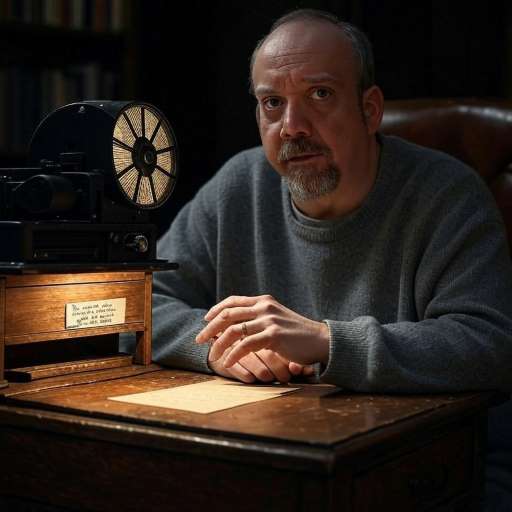
Uhl in His Old Office:
“No,” Eisenheim said, pausing. “I ended the illusion. That was the real risk.”
Later that night, Uhl sat alone in his old office, staring at the confiscated projector. Behind the curtain of magic and smoke, behind the decades of deceit and silence, Eisenheim had done what no one else could: he had turned illusion into a weapon for truth.
For years, Vienna had lived under lies—of nobility, of power, of loyalty. And Eisenheim had waited patiently, letting the illusion grow. Because only when people are fully convinced can truth strike hardest.

Sophie’s Return:
The following morning, Leopold’s estate was sealed. Sophie reappeared at the edge of the city, walking freely for the first time in years. And Eisenheim was gone—again.
Only a note remained, left on Uhl’s desk.
“In a world of illusions, the truth is the rarest magic of all.
You once told me there was no such thing as real magic.
Perhaps now you’ll believe otherwise.
— E.”
Epilogue: The legend of Eisenheim grew. He never performed again, but his name became something more than myth—a reminder that even the most beautiful illusion cannot last forever. That truth, though buried, will find its moment to rise.
And when it does, it does not need applause.
It only needs courage.
Here is the ending of truth story from the quote “In a world of illusions, the truth is the rarest magic of all.”
Moral of the story:
Truth, though often hidden beneath layers of deception, has the power to shatter illusions when revealed at the right moment. In a world that rewards appearances, courage and patience are required to protect and reveal what is real.
This story shows that:
- Illusions may entertain or manipulate, but they can’t last forever.
- Truth is powerful, but timing and intention are just as important.
- Justice sometimes requires subtlety, not force.
- Real magic isn’t the trick—it’s the courage to stand for what’s true, even in a world built to obscure it.
To explore more on stories and dive into related ideas, be sure to check out the other posts where we cover all sort of stories related to quotes. Stay tuned for more…..
To explore more on quote topics, be sure to check out the other topics where we cover all categories of quotes. Stay tuned for more…..


Very interesting points you have observed, thankyou for putting up.